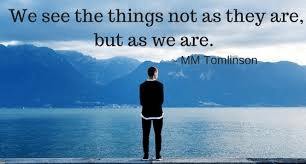

Is your perception, my reality?
- Feb 06th 2018
My son asked me recently whether I would prefer to live in a mansion in the middle of nowhere or a small flat in a busy city? I resisted flipping the question around to him! I answered promptly that I preferred to live in a small flat. I deliberately stopped myself giving the reason why to keep the discussion flowing. ‘Why would you prefer to live in a small flat, Mum?’ was his retort, a little perplexed at my answer. Again, I kept my answer brief, that I liked to be around people and that I didn’t enjoy feeling alone and isolated. This was immediately followed by another perplexed facial expression and a question which seemed so obvious to him that I sensed he was almost questioning why he had to even ask it! – ‘But what makes you think you’d be all alone?’ He paused and waited for my response. This wasn’t the first time my nine-year old has challenged my thought processes. I took a few moments to respond wondering if this was a trick question…..but before I could answer he continued, ‘If you had a mansion, you can invite all your family and friends around so that you’d have a big house for lots of people to stay in!…in a flat in a busy city, you could be all alone with no one visiting you!’
Of course, that made sense to me. And in that moment, he helped me shift my mindset to look at the question from a different perspective. We continued to discuss what it means to be ‘all alone and isolated’ and an interesting conversation followed about the difference between ‘being alone’ and loneliness. As is often the case with my nine-year old, he constantly encourages me to think deep. I focused in on the phrases ‘middle of nowhere’ and ‘busy city’ to give my prompt response; he focused on the spatial possibilities offered by the words ‘mansion’ and ‘small flat’. And it served as a reminder to me as a coach of the need to listen at levels beyond the ‘internal’ i.e. I interpreted the words I heard in terms of what they meant to me. My son’s response to my answer catapulted me into the ‘whole body’ or ‘global’ listening level – his body language (raised arms and quizzical look) and raised tone of voice sent a very strong signal to me that he was confused, even slightly frustrated, by my response. How could I possibly not see things from his angle?
Although I was entitled to respond to the question posed to me, the strength of his response forced me to take a moment to see things through his lens. The last time I did this fully was through a ‘perceptual positioning’ exercise when I was helped, during a coaching conversation, to imagine the thoughts and feelings of said son!
Perceptual Positioning helps you imagine what difficult situations look like when viewed with others’ eyes. The term refers to the ability to imagine what others perceive by imagining you are that other person. The first position is your own natural perspective in which you are fully aware of what you think and feel; you see, hear and feel situations through your own filters. The second position is about imagining what it’s like to be another person; to consider others’ needs and concerns; you see, hear and feel situations though the filters of another person. In the third position, you assume an independent position; you act as a detached observer noticing what’s happening in the relationship between two other people; you see, hear and feel the situation through the filters of an observer.
In my case, I was helped to imagine my son’s thoughts and feelings following a quarrel with me in which I felt that he wasn’t listening to me. I was asked to physically move to a different chair in the room and adopt my son’s mannerisms. I shifted my perspective into that of my son through skilful questioning on the part of my coach, Rajat https://coach-to-transformation.com
By stepping out of first position to experience this second position, the ‘awareness’ moment was powerful, if a little upsetting to me. The exercise enabled me to shed light on the situation – and the crux of it was whilst I felt he was not listening to me because of his actions; his actions were in direct response to him feeling unlistened to…by me.
Michael Carroll explains how human beings do not operate in the real world; they operate in maps of the world. He indicates how we all have our own way of viewing the world; how people interpret events differently which is why they end up with different models of the world. So exploring first, second and third positions enable you to experience different forms of representation that map a situation from different perspectives helping you to shed new light – often, as I experienced, with powerful consequences. Alfred Korzybski coined a saying that ‘the map is not the territory’ which explains why we get so much conflict in the world and why we may disagree with loved ones. Our map is defined by how we take in information through our own perceptual filter; the ‘territory’ is the reality itself – our maps may not match the territory – they are our versions of reality. Greg Sellar explains that when we coach clients through our own maps of the world, we are not taking the time to seek clarification about their current mindset, expectations, values and beliefs
As a mother, a teacher and a coach, I can see the power of perceptual positioning from helping you to momentarily adopt another persons’ perspective – why wouldn’t I enjoy living in a mansion in the middle of nowhere in a space big enough to invite all my friends and family to share, enjoy and have fun? – to helping you to deeply understand the needs and motivation of others and the impact of your own actions.
One powerful question from my son set me off on an awareness journey of my own; reinforcing the importance of listening, imagining and shifting my perceptual filters so that my model of the world is fluid and not fixed.
I’m looking forward to the next question from him…
References:
http://www.nlpacademy.co.uk/articles/view/using_perceptual_positions/
http://www.gregsellar.com/the-map-is-not-the-territory/


Rajat Garg
Rajat is a Master Certified Coach (MCC) with over 18 years of industry experience and over 2500 hours of coaching experience, helping people and organizations attain maximum effectiveness. His background includes working with CXOs, senior managers, managers and board of directors of small private companies to multi-billion dollar publicly traded organizations.









0